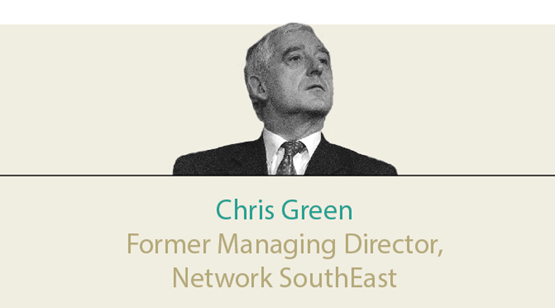
This article reminds us of Brunel’s legacy in innovation, design and engineering, which continues to inspire today’s railway leaders. The elegant stone used in his bridges and tunnels also reminds us that infrastructure development needs quality raw materials, today as then. No surprise then that construction stone remains one of the main rail freight flows on the Great Western, feeding the demands of the building sector in London and the South East.
Brunel’s great steam ships knew a thing or two about international trade, and I am sure he would have been proud to see his railway playing such a vital role in moving imported and exported goods from Southampton and Bristol ports. Given the importance of these services, it is perhaps surprising that the Route Supervisory Board is so light on freight content.
It is worth saying from the outset that conceptually the Board clearly has merit. I have not yet met with Dick Fearn, but those who have are impressed with his approach and his engagement, and a sensible and open approach to the freight ‘question’. That it is a question, however, emphasises the lack of clarity on how Network Rail intends its various devolved parts to work together to deliver for national operators as well as for those aligned with specific routes.
It is clearly impossible for the MDs of national operators to attend eight or more different Boards. In time, if the concept is rolled out, Paul McMahon (who leads Network Rail’s Freight and National Passenger Operators route, FNPO) may well seek to establish his own Supervisory Board. Indeed, there would be support for one. Whether the National System Operator will also follow suit remains to be seen, but given its key role there is probably a case for so doing.
Yet unless FNPO has any authority with the geographic routes, such a framework will have its limitations. The Western Route is likely to have a freight performance metric on its scorecard, but no other freight measures. There is good alignment between the Strategic Business Plans, which may also help. For day-to-day operations, however, or where there are new developments outside of the plan, the ability of freight operators to influence route actions really could be very limited.
On the Western, the scale of programme for the passenger railway remains immense, but there are freight consequences as well. Capacity is getting tighter for any new services, the programme of gauge clearance remains incomplete, and the work to enable longer trains from Southampton (which should be finished by the end of CP5) will also have impacts. The planning of construction trains at the London end remains a priority in new timetables, post-electrification and post-Crossrail. And there could be further changes, with the new runway at Heathrow possibly requiring closure of the Colnbrook branch and the relocation of the terminals it serves.
This all means that freight cannot be an afterthought for the Supervisory Board. There must be a proactive and informed approach, instead of one where operators are asked to attend like naughty schoolchildren if performance is bad! Dick Fearn can get this right, and we look forward to seeing his approach in action.

I am a strong supporter of the Joint Supervisory Board concept. It feels like the right idea at the right time, and one that is not trying to impose yet another reorganisation on an over-stretched industry. The idea is just to make the existing structure work better.
When I was MD at Virgin Trains, I remember wishing we had just this sort of problem-sharing group to get us through the chaos of the West Coast Upgrade - but the new rail industry was still too immature and unstable for this at the time.
We are now 20 years into privatisation, and the Great Western Board is showing us that the industry players have finally achieved the maturity and confidence to share their problems and aspirations in open discussion with each other. Instead of sitting in their corners muttering about other players, the GW route users can now table their concerns for discussion and resolution at their new joint Supervisory Board.
They will not be short of issues to discuss: Heathrow Express wants an ultra-reliable airport shuttle on the main lines; GWR wants an expanded IEP timetable on the same tracks; and freight and Crossrail are seeking a modus operandi on the congested Relief Lines. These conflicting needs are clearly more likely to be solved if the principals understand and acknowledge each other’s needs.
Network Rail has had the challenging task of meeting these disparate customer needs, while also trying to upgrade the Great Western Main Line around them. Had the Joint Supervisory Board existed five years ago, I suspect we might have seen a far smoother upgrade - particularly if the Project Director had been included on the Board. As it is, the new Board still has a major role to play in finding less intrusive ways of completing the GW Upgrade, with its endless demand for line closures and possessions. The Board’s first big win could well be to find acceptable ways of reducing proposals for yet another six days of disruption in the Paddington area this Christmas.
Dick Fearn is the ideal choice to lead the pilot Supervisory Board. He blends railway knowledge and experience with the personal skills to enthuse and persuade people to sensible solutions. As he says, he does not need executive power - his role is to persuade those with the authority to find better solutions together.
If I have a concern, it would be that the Engineering Standards and Major Projects side of Network Rail still seem to be left as centralised silos at Milton Keynes. The new Boards should be pushing to have routine project work delegated back to the Route Directors - including the authority to issue derogations from over-draconian central standards. Future Major Project Directors should also be represented at senior level on the new Supervisory Boards.
I for one would hope that the GW pilot Board will be rolled out across the industry in 2018, as evidence that a mature rail industry is getting its act together.













